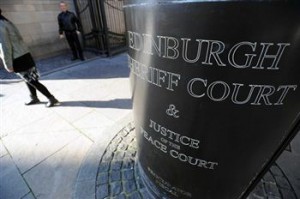
By Kevin Duguid
ONE in eight reported crimes are being dropped by Scottish prosecutors before they are heard by a judge or jury, new figures reveal.
More than 1.4million crime reports have been sent to the Crown Office and Procurator Fiscal Service (COPFS) in the last five years.
But 180,000 of them were scrapped before they were processed by the courts.
The dropped cases cost a bare minimum of £10million to investigate and more than a million man hours.
Commentators have called for the Scottish legal system to be tightened and have lamented the cash lost by the scrapping of so many cases.
Freedom of information figures released by the COPFS show that more than 56,000 cases were dumped because the Crown did not have sufficient evidence.
And more than 15,000 were shelved because of delays by the police.
A further 2400 cases were not pursued because of delays by the fiscal service.
More than 42,000 cases were stopped in their tracks after prosecutors deemed further action to be disproportionate.
The figures have been revealed after an Audit Scotland report suggested police officers are being encouraged to submit reports, later dropped by the Crown Office, to improve detection rates.
TaxPayers Alliance Campaign Director Emma Boon said: “The police should be concentrating on combating crime, not filing reports to make it look like they’re achieving something when they’re not.
“Every case that is dropped means that all the taxpayers’ money and time spent on investigating and preparing it has been utterly wasted.
“Cases dropped because of police delays are completely avoidable and cases that are dropped because of lack of evidence raise serious question on why they were filed in the first place.
“Taxpayers’ will be angry that time and money is being wasted on paperwork and court time that is never going to result in a conviction. This news will be a huge blow in the public’s confidence in the police’s willingness to tackle criminals head on.”
Lyn Costello, of the support group Mothers Against Murder and Aggression, said: “There’s a victim at the end of every crime. When we speak to young people about crime, especially violence, they laugh at us because they know their chances of going to prison. If we really want to take control of crime in this country then we have to tighten up our criminal justice system.”
Major crimes can takes years to investigate and can cost tens of thousands of pounds.
Police insiders say that even the smallest investigations, including the submission of a report to Crown officials, can take up to six hours at a cost of around £60 each.
A report release by Audit Scotland earlier this month called An Overview of Scotland’s Criminal Justice System claimed police officers may submit flimsy cases to boost detection rates. “Officers may be encouraged to submit reports to COPFS which are subsequently marked for no proceedings in order to improve performance in detection rates,” said the reporters.
But a source close to the police said. “You are always going to get a number of cases which fall because of insufficiency of evidence.
“It’s not the role or duty of the police to decide if a case is prosecutable or not. That’s the duty of the procurator fiscal.”
And they said there were numerous reasons why cases were dropped because of police delays. “Sometimes delays are because of sheer workload. Sometimes it’s because you’re waiting for the return of documents from a local authority or a government department. It can take weeks and weeks nowadays. At other times it’s because you can’t track down witnesses,” they said.
There have been a number of high profile cases dropped by prosecutors in recent months.
A rape charge against Dundee United and Scotland footballer David Goodwillie was dropped earlier this year.
Mr Goodwillie, 22, was accused of assaulting a 24-year-old woman at a house party in West Lothian on January 2. But the Crown Office said there was “insufficient evidence in law” for the case to proceed.
The Crown also said there was insufficient evidence in the case of 21-year-old Allan White, who was charged after Susan Boyle claimed he’d charged her “grossly excessive” amounts for mowing her lawn and trimming her hedge.
He was due to appear at Livingston Sheriff Court in August. But the case was dropped before it was processed by the court.
A spokesman for the Crown office said: “COPFS works constantly with the police and specialist reporting agencies to ensure that the quality of reports received by COPFS is high and that our marking decisions are fully informed.”

